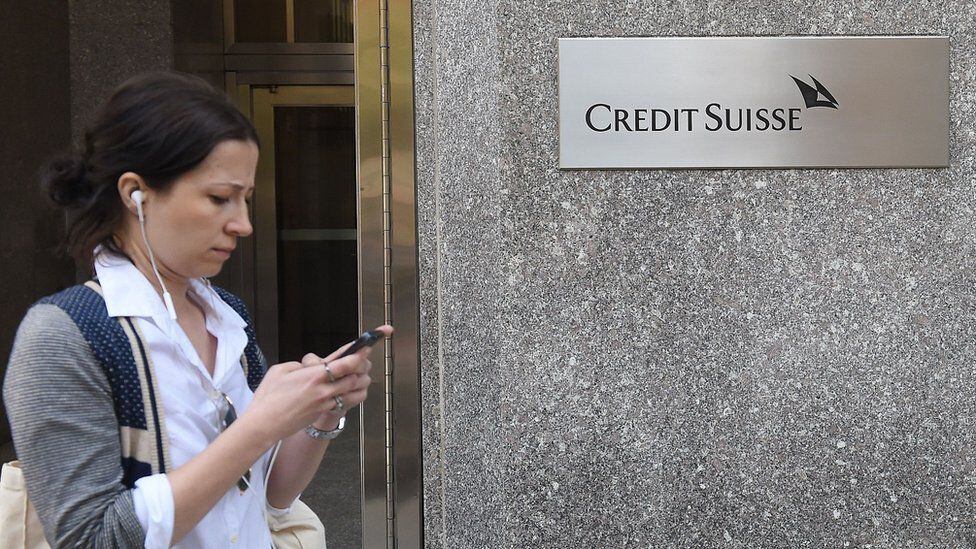Goodbye Credit Suisse.
Founded in 1856, the bank has been a pillar of the Swiss financial sector ever since. Although hit by the 2008 financial crisis, Credit Suisse it managed to weather that storm without a government bailout, unlike its rival UBS, which has just acquired it for US$3.24 billion in the face of the danger of the entity collapsing.
LOOK: What is happening with world banking and how worrying is the situation
More recently, the face of the Credit Suisse brand has been Switzerland’s tennis god, Roger Federer. He smiles from billboards at Swiss airports, a symbol of strength, excellence, staying power and reliability.
But behind the brilliant promotion were some major problems. Divisive management, costly exposure to finance company Greensill Capital, which collapsed in 2021, a sordid case of money laundering and a decline in customer confidence in recent months, with billions being withdrawn from the bank.
All it took to turn those doubts into a stampede was a seemingly offhand comment from the Saudi National Bankwhich owns almost 10% of Credit Suisse, suggesting it would not increase its investment.
Credit Suisse shares went into free fall, and even a Swiss National Bank statement of confidence and one $50 billion offer in financial support they were unable to stabilize the situation.
“asleep at the wheel”
How could this happen?
After the financial crisis 15 years ago, Switzerland introduced strict laws called “too big to fail” for its largest banks. Never again, he thought, should the Swiss taxpayer have to bail out a Swiss bank, like UBS did.
But Credit Suisse is a “too big to fail” bank. In theory, he had the capital to avoid this week’s catastrophe.
Also, in theory, Swiss financial regulators and the Swiss National Bank keep an eye on those major banks and can intervene before disaster strikes.
It was strange, last week, to see the rest of the world react with genuine concern to Credit Suisse’s stock plunge and not hear anything, at first, in Switzerland.
Even the Swiss media seemed oblivious to the Financial Times headlines and seemed more interested in the ongoing debate over how much support neutral Switzerland should offer Ukraine.
By the time people realized what was happening, such damage had already been done that Credit Suisse could no longer be saved. The consequences had begun to threaten not only the entire financial sector in Switzerland, but also in Europe.
As the government met in emergency session to try to find a solution, you could almost smell the panic in Bern.

Announcing the acquisition of the bank, Swiss President Alain Berset said that “an uncontrolled collapse of Credit Suisse would have incalculable consequences for the country and the international financial system”.
It’s hard to avoid the conclusion, some Swiss now say, that the very people who should have acted to prevent Credit Suisse’s collapse were asleep at the wheel.
Switzerland’s reputation damaged
This lack of attention is going to be very expensive. The paltry $3 billion acquisition of UBS, apart from being a complete humiliation for Credit Suisse, is likely to leave its shareholders a little poorer.
There will also be job losses, perhaps thousands of them. There are branches of Credit Suisse and UBS in almost every Swiss city. Once the takeover is complete, it won’t make much sense for UBS to keep them open.
But perhaps the costliest damage of all could be Switzerland’s reputation as a safe place to invest.
Despite scandals over the years involving the secret bank accounts of de facto rulers (including Ferdinand Marcos of the Philippines, Congolese Mobutu Sese Seko, and many more), or money laundering by drug lords and tax evaders, Swiss banks clung to that reputation symbolized by Roger Federer: strong and reliable.
But what now? What to make of a system that allows a 167-year-old bank to collapse in a few days, at the cost of many jobs and massive losses in share value?
That could cause great reputational damage. The Swiss banking sector, Switzerland’s financial regulators and its government say the acquisition is the best solution.
In the end, at the last minute, it was the only solution. In the next few days there will be some difficult questions to answer.
Source: Elcomercio
I am Jack Morton and I work in 24 News Recorder. I mostly cover world news and I have also authored 24 news recorder. I find this work highly interesting and it allows me to keep up with current events happening around the world.

:quality(75)/cloudfront-us-east-1.images.arcpublishing.com/elcomercio/GE3DANJNGAZS2MRRKQYDAORRGY.jpg)

:quality(75)/cloudfront-us-east-1.images.arcpublishing.com/elcomercio/UM5QEHTIAJCYNLHSXX4IA2IHGU.jpg)
:quality(75)/cloudfront-us-east-1.images.arcpublishing.com/elcomercio/XZDZYMH6IVC5PM755WVEKDFUWI.png)
:quality(75)/cloudfront-us-east-1.images.arcpublishing.com/elcomercio/Z7OEUU4X55EFRPVVUSSIQ4LAN4.jpg)
:quality(75)/cloudfront-us-east-1.images.arcpublishing.com/elcomercio/I7RTEOSUTNDDXN4WWB3YCINMGU.jpg)
